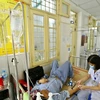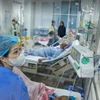The wet weather currently blanketing the country was making it easier for bacteria to spread, resulting in an increase of respiratory and digestive diseases, and chicken-pox among children in both northern and southern areas, according to doctors.
Nguyen Thanh Nam, deputy head of the Paediatrics Ward at the Ha Noi-based Bach Mai Hospital, said that most children admitted to the hospital were under two years old.
On the average, the ward examined 250 children per day, and about 80-100 of them were hospitalised with fever, respiratory diseases and dengue fever.
"The ward only has 60 beds, so many children have to share," said Nam.
Chu Anh Van, head nurse of the Respiratory Diseases Department at the National Paediatrics Hospital, said that the number of children suffering from pneumonia and bronchitis had increased sharply.
"We have 88 beds full of children, and we are having to move some to other wards to prevent diseases from spreading," said Van.
In Ho Chi Minh City, doctors at the Paediatrics Hospital No 1 said that the number of child chicken-pox cases had increased in recent days.
Truong Huu Khanh, head of the Isolation Ward, said that each day the hospital received 5-6 children. They were hospitalised with septicaemia and skin poisoning as the after-effect of chicken-pox, he said.
Tran Dac Phu, Director of the Preventive Medicine Department under the Ministry of Health, said that the abnormal weather had lowered people's resilience, especially children and the elderly.
Since the beginning of this year, 5,200 cases of dengue fever have been reported, resulting in three deaths. The number of cases has increased by 27 percent compared with the same period last year.
Phu said that to prevent diseases, children should be given vaccines based on the ministry's schedule.
Children with diseases should be isolated, and environmental and personal hygiene should be ensured.
If children show symptoms of disease, they should be taken to the hospital in time for proper treatment.-VNA
Nguyen Thanh Nam, deputy head of the Paediatrics Ward at the Ha Noi-based Bach Mai Hospital, said that most children admitted to the hospital were under two years old.
On the average, the ward examined 250 children per day, and about 80-100 of them were hospitalised with fever, respiratory diseases and dengue fever.
"The ward only has 60 beds, so many children have to share," said Nam.
Chu Anh Van, head nurse of the Respiratory Diseases Department at the National Paediatrics Hospital, said that the number of children suffering from pneumonia and bronchitis had increased sharply.
"We have 88 beds full of children, and we are having to move some to other wards to prevent diseases from spreading," said Van.
In Ho Chi Minh City, doctors at the Paediatrics Hospital No 1 said that the number of child chicken-pox cases had increased in recent days.
Truong Huu Khanh, head of the Isolation Ward, said that each day the hospital received 5-6 children. They were hospitalised with septicaemia and skin poisoning as the after-effect of chicken-pox, he said.
Tran Dac Phu, Director of the Preventive Medicine Department under the Ministry of Health, said that the abnormal weather had lowered people's resilience, especially children and the elderly.
Since the beginning of this year, 5,200 cases of dengue fever have been reported, resulting in three deaths. The number of cases has increased by 27 percent compared with the same period last year.
Phu said that to prevent diseases, children should be given vaccines based on the ministry's schedule.
Children with diseases should be isolated, and environmental and personal hygiene should be ensured.
If children show symptoms of disease, they should be taken to the hospital in time for proper treatment.-VNA



















